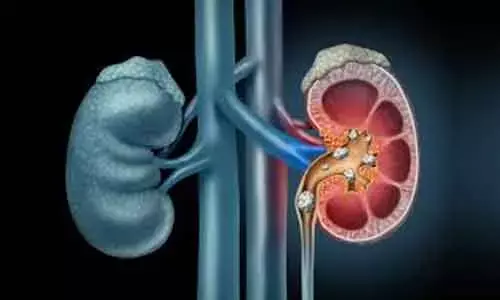- Home
- Medical news & Guidelines
- Anesthesiology
- Cardiology and CTVS
- Critical Care
- Dentistry
- Dermatology
- Diabetes and Endocrinology
- ENT
- Gastroenterology
- Medicine
- Nephrology
- Neurology
- Obstretics-Gynaecology
- Oncology
- Ophthalmology
- Orthopaedics
- Pediatrics-Neonatology
- Psychiatry
- Pulmonology
- Radiology
- Surgery
- Urology
- Laboratory Medicine
- Diet
- Nursing
- Paramedical
- Physiotherapy
- Health news
- Fact Check
- Bone Health Fact Check
- Brain Health Fact Check
- Cancer Related Fact Check
- Child Care Fact Check
- Dental and oral health fact check
- Diabetes and metabolic health fact check
- Diet and Nutrition Fact Check
- Eye and ENT Care Fact Check
- Fitness fact check
- Gut health fact check
- Heart health fact check
- Kidney health fact check
- Medical education fact check
- Men's health fact check
- Respiratory fact check
- Skin and hair care fact check
- Vaccine and Immunization fact check
- Women's health fact check
- AYUSH
- State News
- Andaman and Nicobar Islands
- Andhra Pradesh
- Arunachal Pradesh
- Assam
- Bihar
- Chandigarh
- Chattisgarh
- Dadra and Nagar Haveli
- Daman and Diu
- Delhi
- Goa
- Gujarat
- Haryana
- Himachal Pradesh
- Jammu & Kashmir
- Jharkhand
- Karnataka
- Kerala
- Ladakh
- Lakshadweep
- Madhya Pradesh
- Maharashtra
- Manipur
- Meghalaya
- Mizoram
- Nagaland
- Odisha
- Puducherry
- Punjab
- Rajasthan
- Sikkim
- Tamil Nadu
- Telangana
- Tripura
- Uttar Pradesh
- Uttrakhand
- West Bengal
- Medical Education
- Industry
Alpha Adrenergic blockers may help expel Ureteric calculus less than 10 mm

Researchers have found in a new study that Alpha-adrenergic blockers facilitate the expulsion of lower ureteric stones ≤ 10 mm.The present study was published in the journal UroToday International Journal.
Lower ureteric calculi are the most frequently encountered clinical conditions in daily Urological practice. Waitful watching, Extracorporeal shock wave lithotripsy (ESWL), and ureteroscopic lithotripsy (URSL) are some of the various treatment modalities used for the management of lower ureteric calculi.
Researchers have tried various drugs for the expulsion of lower ureteric calculi. . In their study the authors evaluated the efficacy of drugs in the expulsion of a lower ureteric calculus of size ≤ 10 mm. The drugs used are tamsulosin, naftopidil, tamsulosin and deflazacort, and naftopidil and deflazacort.
The study was a prospective, randomized study conducted in the Department of Urology from August 2012 to January 2013. A total of 150 patients participated in the study. They were randomly divided into 5 equal groups, each having 30 participants. They were:
• A (control),
• B (naftopidil),
• C (tamsulosin),
• D (naftopidil and deflazacort), and
• E (tamsulosin and deflazacort).
All the participants were subjected to the following tests:
• Complete hemograms
• blood urea; serum creatinine
• urine routine examination and culture and sensitivity
• X-ray of the kidney, ureter, and bladder (KUB); and/or ultrasonography.
All the participants were followed up to 30 days or upon spontaneous passage of the calculus, whichever was earlier. X-ray KUB and/or ultrasonography were done to confirm the passage of the stone.
From the study the authors found the following:
• The expulsion rate for a calculus ≤ 10 mm was statistically significant in all the groups in comparison to the control group.
• The mean days of expulsion and use of analgesics was also low in all the groups compared to control.
• Amongst all groups, the stone expulsion rate was highest, and episodes of pain and mean days of expulsion were lowest for the D group.
The researchers concluded that alpha-adrenergic blockers facilitate the expulsion of lower ureteric stones ≤ 10 mm and decreases the episodes of colic, which is further improved by the addition of deflazacort. They also added that Naftopidil plus deflazacort gives the best results regarding stone expulsion rates, mean days of expulsion, and episodes of colic.
To read more about the article, click the following link: http://dx.doi.org/10.3834/uij.1944-5784.2013.10.09
BDS, MDS
Dr.Niharika Harsha B (BDS,MDS) completed her BDS from Govt Dental College, Hyderabad and MDS from Dr.NTR University of health sciences(Now Kaloji Rao University). She has 4 years of private dental practice and worked for 2 years as Consultant Oral Radiologist at a Dental Imaging Centre in Hyderabad. She worked as Research Assistant and scientific writer in the development of Oral Anti cancer screening device with her seniors. She has a deep intriguing wish in writing highly engaging, captivating and informative medical content for a wider audience. She can be contacted at editorial@medicaldialogues.in.
Dr Kamal Kant Kohli-MBBS, DTCD- a chest specialist with more than 30 years of practice and a flair for writing clinical articles, Dr Kamal Kant Kohli joined Medical Dialogues as a Chief Editor of Medical News. Besides writing articles, as an editor, he proofreads and verifies all the medical content published on Medical Dialogues including those coming from journals, studies,medical conferences,guidelines etc. Email: drkohli@medicaldialogues.in. Contact no. 011-43720751


